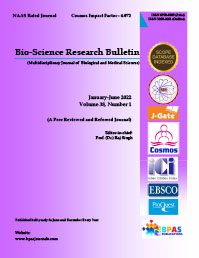Insecticidal Activities of Four Citrus Essential Oils on the Bean Weevil Longevity, Acanthoscelides obtectus Say. (Coleoptera: Bruchidae)
DOI:
https://doi.org/10.48165/Keywords:
Acanthoscelides obtectus, Bean, Citrus, Essential Oils, Toxicity, LongevityAbstract
The study focuses on the evaluation of the insecticidal potential of Citrus limonum, C. sinensis, C. paradisi and C. aurantium as bioinsecticides to reduce the damage caused by the pest Acanthoscelides obtectus on white bean crops. The toxicity of essential oils extracted from 04 species of Citrus was tested under laboratory conditions at 30°C and 70% RH by three modes of action contact, inhalation and repulsion on the A. obtectus adults longevity. The results obtained for the parameter studied indicate that the essential oils extracted from C. limonum, C. sinensis and C. paradisi exert a more or less significant toxicity towards the insect pest for all the tests carried out, however the oil extracted from C. aurantium is the most effective since the A. obtectus longevity decreases from the lowest dose of 2µl and is 100% at 6µl. Regarding the inhalation test, the fumigation effect is very important from the lowest doses achieved with C. aurantium essential oil, on the other hand the other oils have only shown significant effectiveness at the highest doses. The results of the repellency test revealed that C. aurantium essential oil is the most repellant compared to the other essential oils tested.
References
Bittner M.L., Casanueva M.E., Albert C.C., Aguilera M.A., Hernadez V.J. and Becerra J.V. (2008). Effects of essential oils from five plant spicies against the granary weevils Sitophilus zeamais and Acanthoscelides obtectus (Coleoptera). J. cm. Chem. Sp. 53(1),1455-1459.
Bouchikhi Tani A. Khelil M A, Bedahou M et Pujade V. (2011). Lutte contre les trois bruches Acanthoscelides obtectus Say, Bruchus rufimanus Boh, Callosobruchus maculatus F. (Coleoptera : Chrysomelidae : Bruchidae) par les huiles essentielles extraites d’Origanum glandulosum (Lamiacées). Bull. Inst. Cat. Hist. Nat., 76, 177-186.
Don-Pedro K.N., (1996). Fumigant toxicity of citrus peel oils against adult and immature stages of storages insect pest. Pestic. Sci. 47, 213-223.
Gokturk T., Kordali S., Ak K., Kesdek M., Bozhuyuk A.U., (2020). Insecticidal effects of some essential oils against Tribolium confusum (du Val) and Acanthoscelides obtectus (Say) (Coleoptera:Tenebrionidae and Bruchidae) adults. International journal of tropical insect sciences. 40 (3), 7.
Hamani-Aoudjit S. (2019). Bioécologie et bio contrôle de la bruche de la fève Bruchus rufimanus (Coleoptera : Chrysomelidae) dans la région de Bouira. Thèse de doctorat es Sciences Biologiques. Université Mouloud Mammeri de Tizi-Ouzou. Algérie. 153p
Haubruge E., Lognay G., Marlier M., Danhier P., Gilson J.C. et Gaspar CH., (1989). Etude de la toxicité de cinq huiles essentielles extraites de Citrus sp. à l’égard de Sitophilus zeamais Motsch., Prostephanus truncatus (Horn) et Tribolium castaneum Herbst. Med. Fac. Landbouww. Rijksuniv. Gent 54/3b, 1083-1093.
Hedjal-Chebheb M., Medjdoub-Bensaad F., Toudert-Taleb K., Mediouni-Bendjemaa D.
(2022). Fumigant and Repellent Effects of Eucalyptus cinerea and Eucalyptus maidenii Essential Oils on Callosobruchus maculatus F. (Coleoptera: Bruchidae) and Sitophilus oryzae L. (Coleoptera: Curculionidae). Bio-Science Research Bulletin. 38(1), 44-53.
Hossaert-McKey M. et Alvarez N., (2003). Influence de facteurs écologiques sur la répartition de deux espèces jumelles de ravageurs du haricot, Centre d'Ecologie Fonctionnelle et Évolutive, Montpellier
Keita S. M., Vincent C., Schmidt J.P., Arnason J.T. and Belanger A., (2001). Efficacity of Essential oil of Ocimum basilicum L. and O. gratissimum L. applied as an Bruchus maculatus ( Fab.) J. Stored Prod.Res. 37, 339-349.
Kim S., J. Roh D. Kim H. Lee and Ahn Y. (2003). Insecticidal activities of aromatic plant extracts and essential oils against Sitophilus oryzae and Callosobruchus chinensis. Journal Stored Product Reaserch. 39, 293- 303.
Kotan R., CakirA., Dadasoglu F., Aydin T., Cakmakci R., Ozer H., Kordali S., Mete E., Dikbas N. (2010). Antibacterial activities of essential oils and extracts of Turkish Achillea, Satureja and Thymus species against plant pathogenic bacteria. Journal of the Science of Food and Agriculture, 90,145- 160.
MC Dounald L.L., Guyr H. et Speire R. D. (1970). Preliminary evaluation of new candiolate materials as toxicants, repellent and attracts against stored product insect marketing Res.189 p.
Ndomo A.F., Tapondjou A.L., Tendonkeng F. et Tchouanguep F.M., (2009). Evaluation des propriétés insecticides des feuilles de Callistemon viminalis (Myrtaceae) contre les adultes d’Acanthoscelides obtectus (Say) (Coleoptera; Bruchidae). Tropicultira. 27, 3, PP 137-143.
Rajapakse R. H. S., Senanayakae S. G. J. N. and Ratnasekera D., (1998). Effect of five botanicals on oviposition, adult emergence and mortality of Collosobruchus maculatus Fabr. (Coleoptera: Bruchidae). J. Ent. Res. 22(2), 1-6.
Regnault-Roger C. and Hamraoui A., (1995). Fumigant toxic activity and reproductive inhibition induced by monoterpenes on Acanthoscelides obtectus (Say) (Coleoptera), a bruchid of kidney bean (Phaseolus vulgaris L.). J. Stored Prod. Res, 31, 291-299.
Regnault-Roger C. et Hamraoui A., (1997). Lutte contre les insectes phytophages par les plantes aromatiques et leurs molécules allélochimiques. Ed. Acta bot. Gallica, PP 401-412.
Sanon A., Ouedraogo A.P., Tricult Y., ,Credland P.F. and Huighard J. (1998). Biological control of bruchid in cowpea stores by release of Dinarmus basalis (Hymenoptera: Paromalidae) adult. Environ. Entomol. Pp: 717-725.
Seri-Kouassi B.P., Kanko C., Aboua L.R.N., Bekon K.A., Glitho A.I., Koukoua G. et Guessan Y.T., (2004). Action des huiles essentielles de deux ploantes aromatiques de côte d’Ivoire sur Callosobruchus maculatus F. du niébé. C.R. Chimie, 7, 1043- 1046
Stamopoulos D. et Huignard J., (1980). L’influence de diverses parties de la graine de haricot P.vulgaris sur le développement des larves d’A. obtectus (Coleoptera: Bruchidae). Ent. Amsterdam, Exp et Appl 28, 38-46.
Toudert-Taleb K., Hedjal-Chebheb M.., Hami, H., Debras J.F and Kellouche A. (2014). Composition of essential oils extracted from six aromatic plant of Kabylian origin (Algeria) and evaluation of their bioactivity on Callosobruchus maculatus (Fabricius, 1775) (Coleoptera: Bruchidae). African Entomology. 22 (2), 417-427.
Tunç L., Berger B. and Dagli F., (2000). Oviidal activity of essential oils from five plants against two stored- product insects J., Stored prod.Res.36, PP 87-102.
Weaver D.K., Dunkel F.V., Ntezurubanza L., Jackson L. L. et Stock D.T., (1991). The efficacy of linalool, a major component of freshly-milled Ocimum canum Sims (Lamiaceae), for protection against postharvest damage by certain stored product Coleoptera. J. stored Prod. Res, 27 (4), 213-220.
